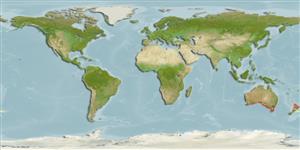Environment: milieu / climate zone / depth range / distribution range
Sinh thái học
Biển gần đáy; Mức độ sâu 10 - 400 m (Ref. 26613), usually ? - 200 m (Ref. 26613). Subtropical; 30°S - 44°S, 134°E - 154°E
Southwest Pacific: known only from Coffs Harbor in northern New South Wales to Portland in Victoria, including Bass Strait and Tasmania.
Length at first maturity / Bộ gần gũi / Khối lượng (Trọng lượng) / Age
Maturity: Lm ?, range 36 - ? cm
Max length : 65.0 cm TL con đực/không giới tính; (Ref. 6390); Khối lượng cực đại được công bố: 3.0 kg (Ref. 6390); Tuổi cực đại được báo cáo: 12 các năm (Ref. 27203)
Found in inshore waters over the continental shelf. Sometimes entering coastal bays (Ref. 9563). Tiger flathead are not active fish and will normally rest on the sea bed during the day in areas of mud and sand substrate (Ref. 6390). They may migrate into the water column at night following prey species (Ref. 27197). Adults feed mainly on small fish such as silversides and three-spined cardinal fish (Ref. 27193) while juveniles feed primarily on crustaceans including krill. The young inhabit shallow waters of the continental shelf and move into the outer shelf zone as they reach maturity (Ref. 6390). Its fin spines are venomous and can inflict mild to severe pain (Ref. 125684).
Paxton, J.R., D.F. Hoese, G.R. Allen and J.E. Hanley, 1989. Pisces. Petromyzontidae to Carangidae. Zoological Catalogue of Australia, Vol. 7. Australian Government Publishing Service, Canberra, 665 p. (Ref. 7300)
IUCN Red List Status (Ref. 130435: Version 2024-2)
Human uses
Các nghề cá: Tính thương mại; cá để chơi: đúng
Các công cụ
Special reports
Download XML
Các nguồn internet
Estimates based on models
Preferred temperature (Ref.
123201): 12.6 - 18.2, mean 14.9 °C (based on 139 cells).
Phylogenetic diversity index (Ref.
82804): PD
50 = 0.5000 [Uniqueness, from 0.5 = low to 2.0 = high].
Bayesian length-weight: a=0.00457 (0.00230 - 0.00908), b=3.09 (2.91 - 3.27), in cm total length, based on LWR estimates for this (Sub)family-body shape (Ref.
93245).
Mức dinh dưỡng (Ref.
69278): 3.9 ±0.62 se; based on food items.
Thích nghi nhanh (Ref.
120179): Trung bình, thời gian nhân đôi của chủng quần tối thiểu là 1.4 - 4.4 năm (K=0.17-0.38; tm=4-5; tmax=12, Fec=1.5 million).
Fishing Vulnerability (Ref.
59153): Moderate vulnerability (39 of 100).
Nutrients (Ref.
124155): Calcium = 135 [13, 597] mg/100g; Iron = 2.32 [0.62, 5.87] mg/100g; Protein = 17.7 [15.4, 20.0] %; Omega3 = 0.362 [0.169, 1.010] g/100g; Selenium = 77.5 [21.3, 272.2] μg/100g; VitaminA = 12.8 [4.3, 36.7] μg/100g; Zinc = 0.698 [0.317, 1.417] mg/100g (wet weight);
